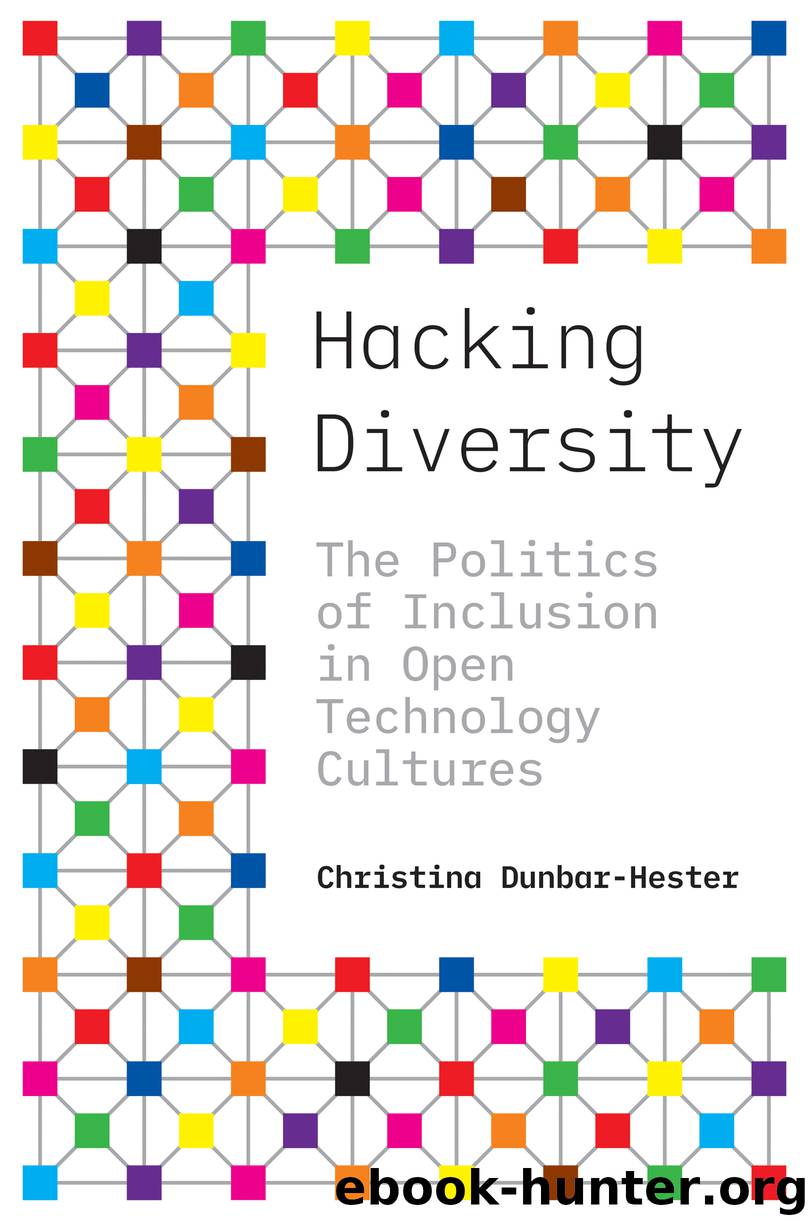Hacking Diversity by Christina Dunbar-Hester

Author:Christina Dunbar-Hester [Christina Dunbar-Hester]
Language: eng
Format: epub, mobi
Publisher: Princeton University Press
Published: 2019-12-09T16:00:00+00:00
Though she supported the idea of doing diversity work for the hackerspace by offering new classes to draw in different sorts of folks, her emphasis was less on vocational training and more on demystification, helping people “get past barriers” and into a realm of practice where joy and agency are palpable. This is also held to be transformative, but less instrumental. And it reaffirms that one of the reasons people engage with technology is for their own pleasure and curiosity. This affective connection to technology and to other people through those shared pleasures are what undergird the communal aspects of voluntaristic technical pursuits. She directs the conversation to expanding the hackerspace’s membership by expanding technical affinity—helping more people to “glow” over their exploration and creation of technology. (She does mention the “money-saving” aspect of DIY, i.e., that making cables could be cheaper than buying them, but this is probably not a primary motivation. Also, of course, much DIY requires consumption to participate.)
By contrast, other diversity advocates have elected to address diversity issues in ways that are explicitly at odds with generating value for the IT industry within prevailing social and economic relations. In an announcement of a 2016 event in Montréal centering on diversity in tech, organizers wrote, “The event aims at addressing the lack of women, queer, trans [people,] and diversity in technological fields in general and hacking more specifically. But even more so, it aims at creating a community that critically assesses the hegemonic narratives around technologies, the modern[ist] aspects of its underlining Western assumptions and its inherent capitalist inflections, among others.”34 Along similar lines, the Oakland makerspace led by people of color listed the following during a discussion of values and vision for the space: “[to be a] welcoming place for poor women, trans, low income, formerly incarcerated … of and for [the] immediate community … political education, social justice … freedom from jobs.”35 In both of these examples, advocates for diversity articulate an alternative value system they hope to implement around technology and technical practice, wherein not only who participates in technological production is changed, but why and how people engage with technology is altered.
Advocates critique how capitalism has shaped hacking and making, and present the underspecified but provocative notion that a makerspace can provide “freedom from jobs,” as opposed to conscripting members of marginalized groups (such as members of minoritized racial and ethnic groups, low-income people, and formerly incarcerated people) to be better producing and consuming capitalist subjects. Critics such as Angela McRobbie have noted that in the knowledge work and creative fields, “work has been re-invented to … become a fulfilling mark of self.” These makerspace participants reject what McRobbie characterizes as an “attempt to make-over the world of work into something closer to a life of enthusiasm and enjoyment.”36 The makerspace is understood not as a training ground for work, but as a place to experience making as both politicized and distinct from capitalist production; the makerspace members reclaim their enthusiasm and enjoyment for making from their work selves.
Download
This site does not store any files on its server. We only index and link to content provided by other sites. Please contact the content providers to delete copyright contents if any and email us, we'll remove relevant links or contents immediately.
| General | Discrimination & Racism |
Nudge - Improving Decisions about Health, Wealth, and Happiness by Thaler Sunstein(6669)
iGen by Jean M. Twenge(4717)
The Fire Next Time by James Baldwin(4375)
Adulting by Kelly Williams Brown(3705)
The Sports Rules Book by Human Kinetics(3617)
The Hacking of the American Mind by Robert H. Lustig(3603)
The Ethical Slut by Janet W. Hardy(3535)
Captivate by Vanessa Van Edwards(3320)
Mummy Knew by Lisa James(3181)
In a Sunburned Country by Bill Bryson(2965)
The Worm at the Core by Sheldon Solomon(2947)
Ants Among Elephants by Sujatha Gidla(2938)
Suicide: A Study in Sociology by Emile Durkheim(2623)
The Slow Fix: Solve Problems, Work Smarter, and Live Better In a World Addicted to Speed by Carl Honore(2587)
Humans of New York by Brandon Stanton(2389)
Handbook of Forensic Sociology and Psychology by Stephen J. Morewitz & Mark L. Goldstein(2385)
Blackwell Companion to Sociology, The by Judith R. Blau(2324)
The Happy Hooker by Xaviera Hollander(2285)
Outliers by Malcolm Gladwell(2272)
